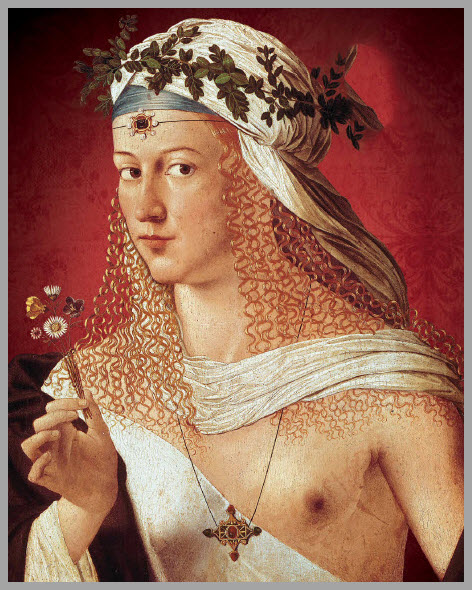
“I cannot think of anyone but you”
- Art
Maria Savorgnan’s Letters to Pietro Bembo
View details about the event: “I cannot think of anyone but you”

Literature, Passions, and Gender Matters in Renaissance Italy

In accordance with NYU Covid Safety Precautions, in order to attend in person, all audience members MUST:
– be 12+ years of age
– show a valid government-issued photo ID
– show proof of being fully vaccinated and boosted (if eligible)
– wear a well-fitted mask at all times
Double Lecture
“Il comun padre delle Muse”
Life, Works and Passions of Pietro Bembo
A lecture by
Marco Faini, University at Buffalo, SUNY
Pietro Bembo may not have invented the Renaissance, as the title of a 2013 exhibition claimed. Yet, no other character epitomizes the splendour and decline of the Italian Renaissance as Bembo does. Born in 1470 to a noble Venetian family, as a boy he followed his father Bernardo to Lorenzo de’ Medici’s Florence. He later gained a reputation as a philologist, a writer of dialogues and poems, and an innovator in the field of the printing press. His Prose della volgar lingua set the standard of the Italian written language for the centuries to come. Appointed cardinal in 1538, Bembo remained throughout his life an avid collector of works of art as well as a lover, friend, and companion of outstanding women. Women play in fact a central role in Bembo’s biography: from Maria Savorgnan whom he trusted with revising his poems to Lucrezia Borgia, from Caterina Cornaro, in whose gardens he set the Asolani, to other key figures of the Renaissance such as Isabella d’Este and Vittoria Colonna. When Bembo died in 1547, the world he had known had long entered a deep political, religious, and cultural crisis. Yet, he managed to remain a leading and inspiring figure for literati and writers. This talk will highlight some key moments in Bembo’s biography and literary career, emphasising the role of women therein and Bembo’s literary influence, both as a model and as a polemical target.
Court Ladies and Courtesans, Lovers and Beloveds
Women in Early Modern Italy
A lecture by
Paola Ugolini, University at Buffalo, SUNY
This talk intends to set the relationship between Maria Savorgnan and Pietro Bembo within the larger context of the role of women in early modern Italian society. Starting from the debate on the nature and the role of women, it will analyze the different opportunities that women could have in the context of early modern Italian court culture, and in the Republic of Venice (where both Savorgnan and Bembo lived), focusing on two very different figures: the respectable court lady, and the scandalous courtesan. It will also highlight how the satiric language used by male writers to mock and attack courtesans was employed within a court context to lament the condition of the early modern literatus living at court. Finally, it will explore the Petrarchist lyrical model set by Bembo in gendered terms, with a specific attention to the case of Gaspara Stampa, a woman poet based in Venice.
In ENGLISH
Conceived by Ida Caiazza (Marie Curie Fellow at New York University), Love and Letters in the Renaissance is a series of lectures and workshops that focus on women’s private writing and the wide array of emotions related to romantic love. The lectures feature international experts of Renaissance studies, Science, History of Emotions, and other fields. The workshops involve students, artists, and scholars in digital and public humanities projects about secret love letter exchanges between lovers.
These events are part of the research project Women Thinking Love. A Gendered History of Emotions in Renaissance and Post-Tridentine Italy (1500-1650). This project has received funding from the European Union’s Horizon 2020 research and innovation programme under the Marie Skłodowska-Curie Grant Agreement no 101024624.
Marco Faini is Assistant Professor of Italian at the University at Buffalo (SUNY). His research interests include biblical epic, macaronic and mock-heroic poetry, devotional literature, cheap-print and popular culture. He has held fellowships at the Herzog August Bibliothek, Wolfenbüttel, at the University of Cambridge, and at Villa I Tatti. The Harvard University Center for Italian Renaissance Studies. He is the co-editor of A Companion to Pietro Aretino (Brill, with Paola Ugolini) and Le doute dans l’Europe moderne (Brepols, with Élise Boillet). He is the author of Standing at the Crossroads. Stories of Doubt in Renaissance Italy, forthcoming with Legenda. His book on Pietro Bembo, L’alloro e la porpora. Vita di Pietro Bembo (Rome, 2016, 2018) has been translated into English and French.
Paola Ugolini is Associate Professor of Italian in the Department of Romance Languages and Literatures and Affiliate Faculty in the Department of Global Gender and Sexuality Studies at the University at Buffalo. She is the author of The Court and Its Critics. Anti-Courtly Sentiments in Early Modern Italy (University of Toronto Press, 2020), and the co-editor (with Marco Faini) of the Companion to Pietro Aretino (Brill, 2022). She has published articles on Ludovico Ariosto, Gaspara Stampa, Pietro Aretino and early modern satires.

